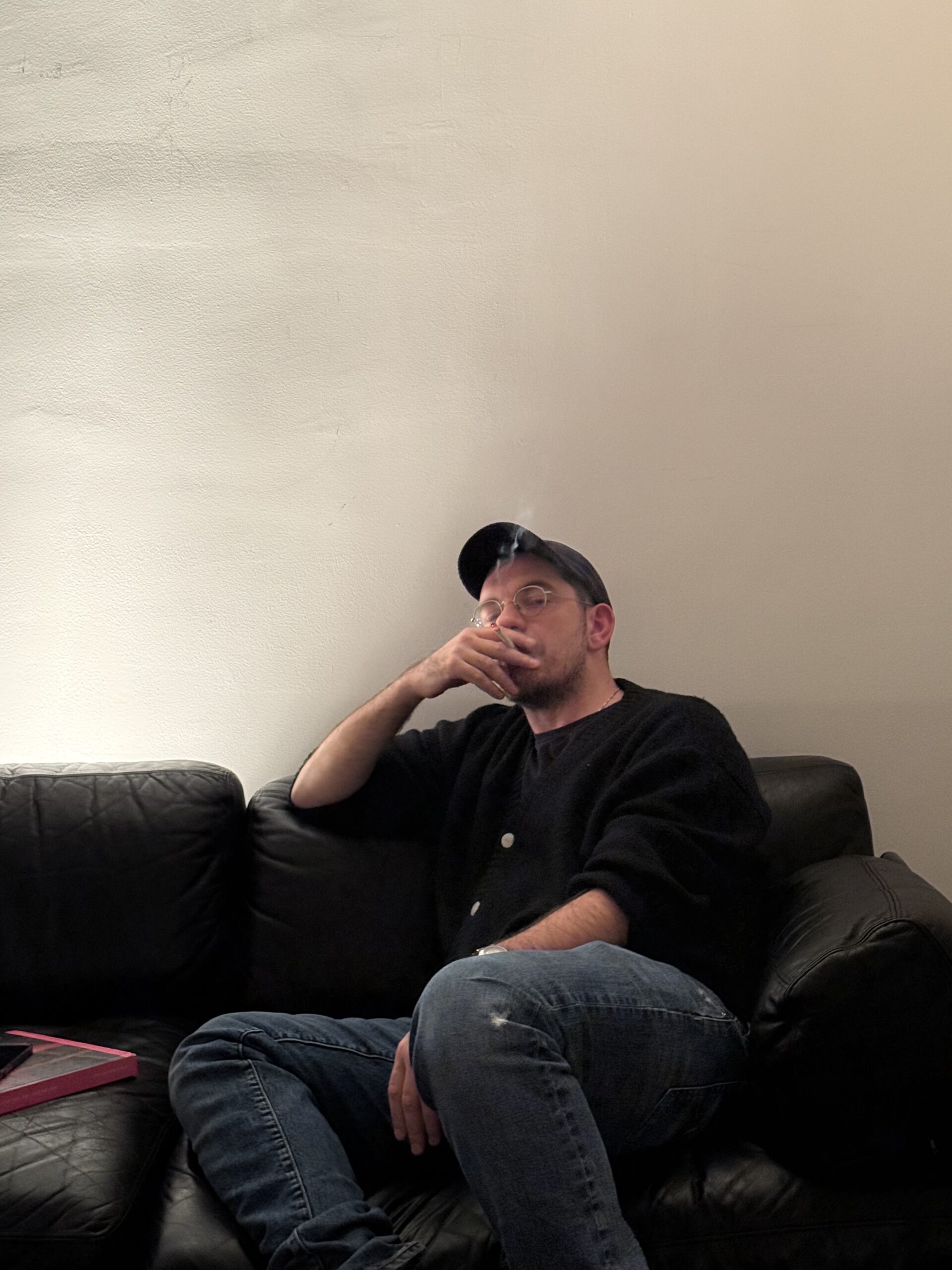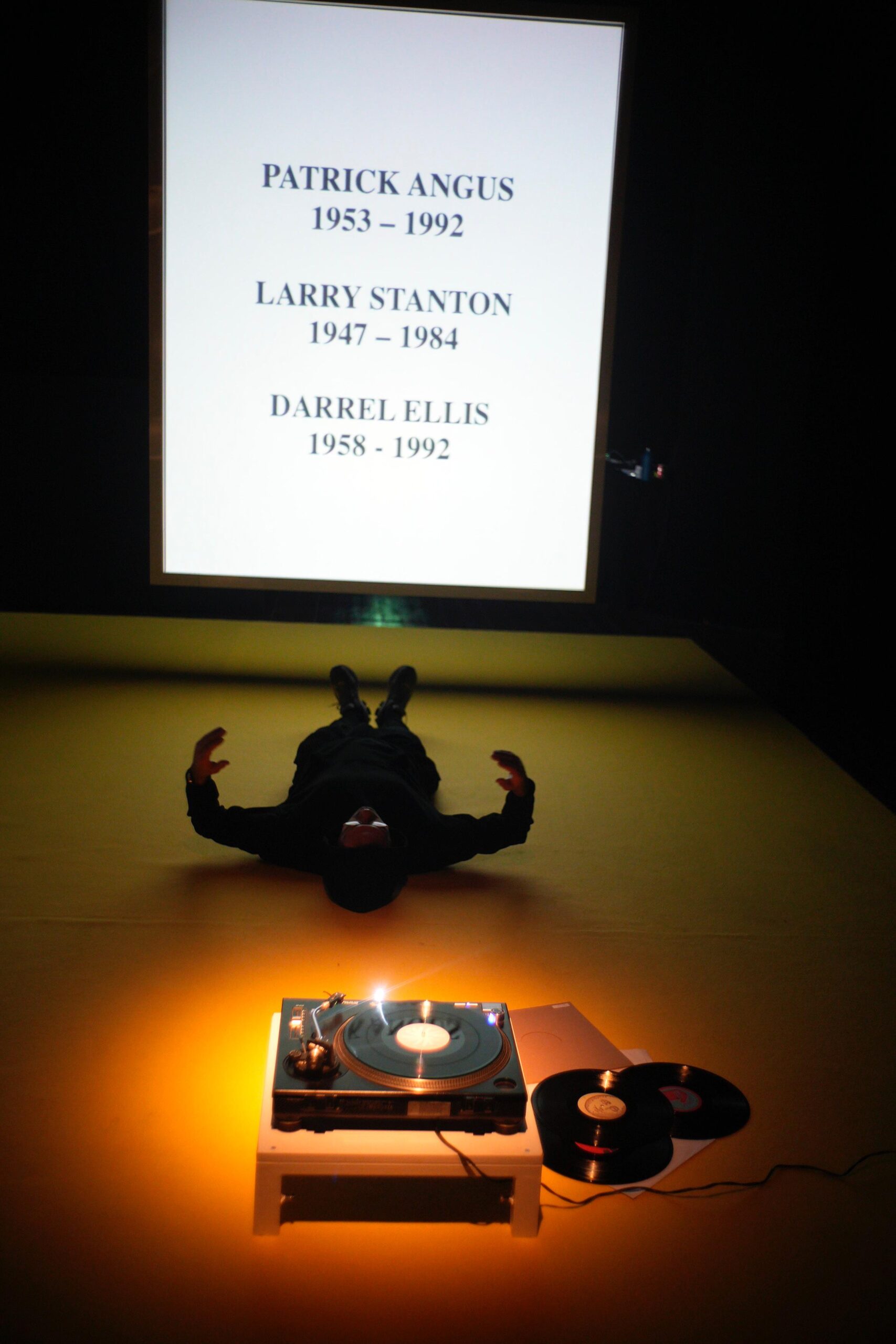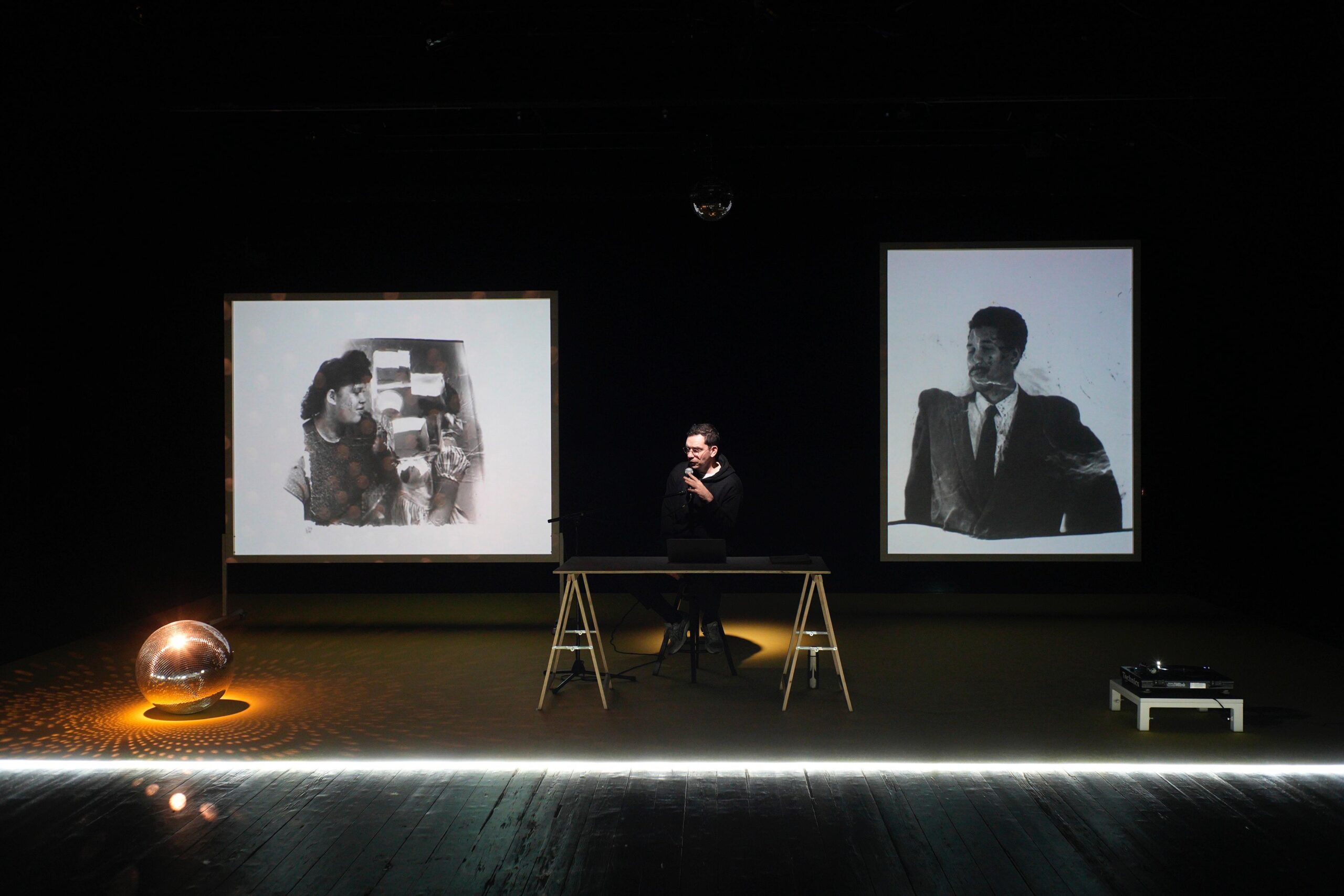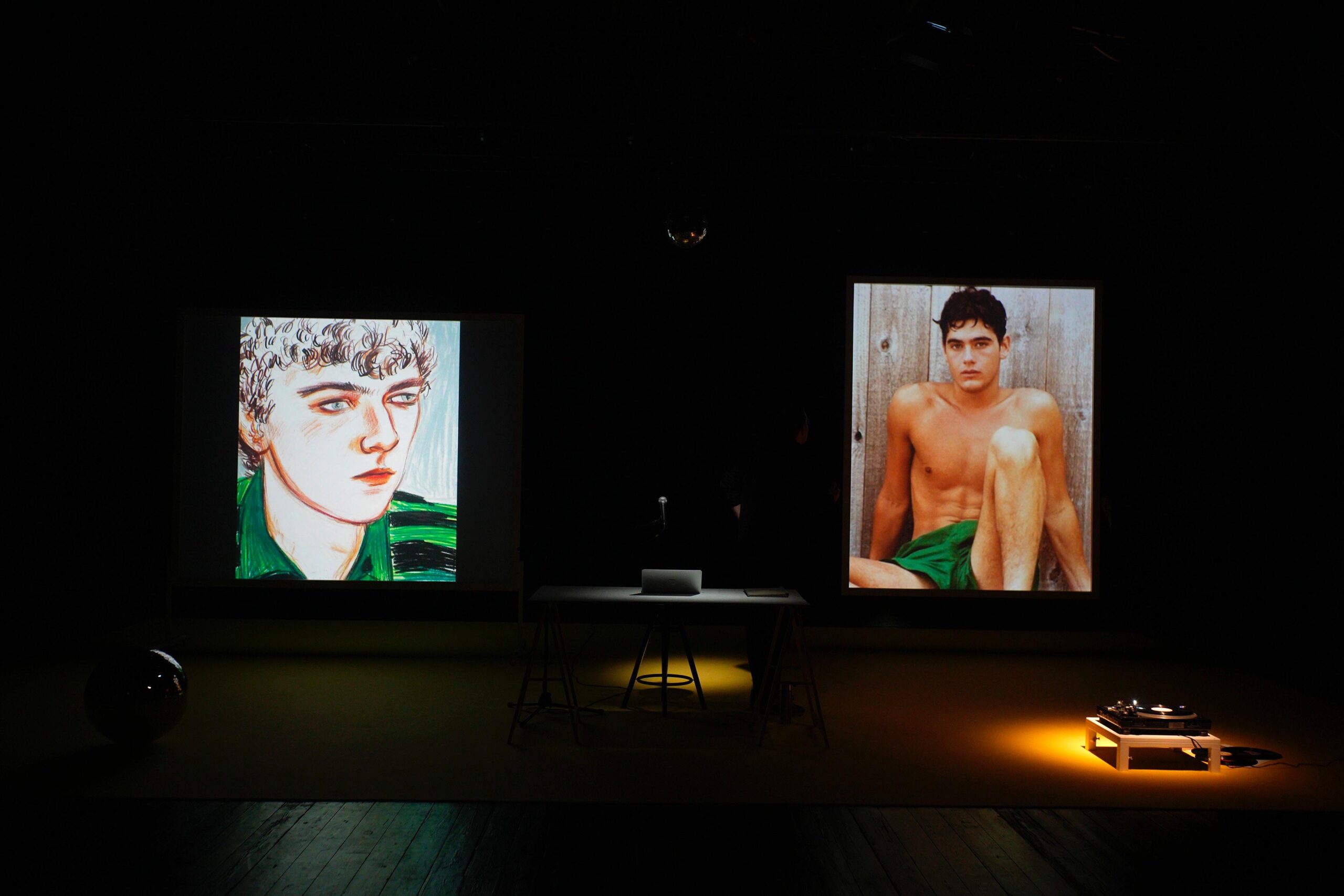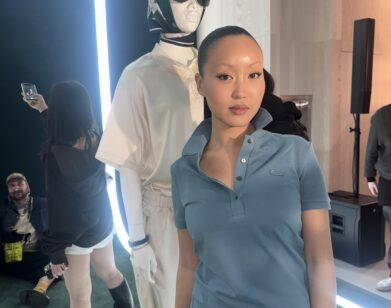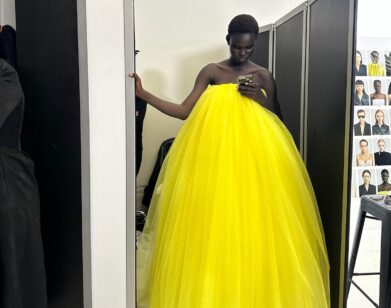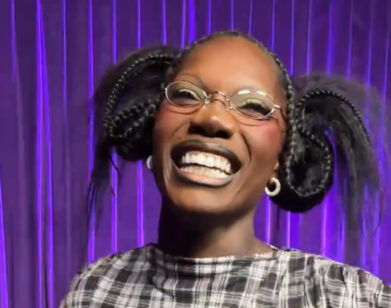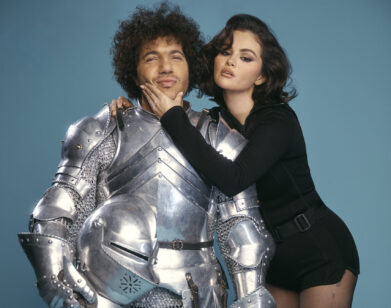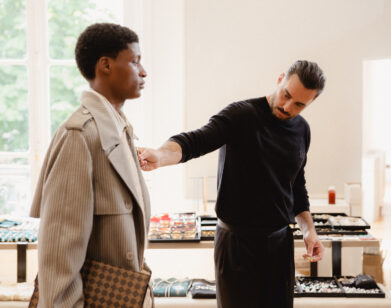SMOKE BREAK
Fabio Cherstich Takes Mel Ottenberg Into the Annals of Gay Art History
Over the years, the Italian theater and opera director Fabio Cherstich has made many trips to the United States, semi-frequent fact-finding missions, often to New York City, during which he’s amassed a wealth of information and artwork by many of the visionary artists whose lives were cut short due to AIDS. His efforts reached a kind of culmination last week—or the first of many culminations—when, over three consecutive nights at the experimental theater landmark, La MaMa, Cherstich combined biography, criticism, performance art, and audience interaction to shine a light on the oeuvres of Larry Stanton, Patrick Angus, and Darrel Ellis. As our editor-in-chief Mel Ottenberg put it, the show is “informative and fun and not boring at all.” The day after the last show, he invited Cherstich over for a smoke—and a deep dive into the annals of queer art history.
———
FABIO CHERSTICH: Can I smoke?
MEL OTTENBERG: Yeah, it’s fine. Here’s an ashtray.
CHERSTICH: Fantastico.
OTTENBERG: I don’t smoke, but I don’t mind it at all.
CHERSTICH: Do you have any matches?
OTTENBERG: Yes. I’m going to play my Christmas mix because I’m really into Christmas music.
CHERSTICH: And how is the jeans line going? So cool, man.
OTTENBERG: Oh, thank you. I’m glad you like it.
CHERSTICH: It’s the right way of displaying a pair of jeans at the end. You need to give a context, you need to have a simple white t-shirt on, and to be cool.
OTTENBERG: Yeah. I really liked doing it and it felt really good. I’m wearing them right now.
CHERSTICH: And you’re wearing your boots, which you know that I loved since the first time that I met you in Milan. Anyway, I was just having dinner at Vince Aletti’s. You know him?
OTTENBERG: I don’t know him. But I’d love to know him.
CHERSTICH: He’s got the most incredible collection of books and magazines. I love him. He has this incredible collection of soft-porn photos from 1910 until now that he constantly buys on eBay. He was a very close friend of Peter Hujar and has an incredible collection of Hujar’s pictures. The city itself is full of this generation of gays that wants to tell their stories because they have incredible lives.
OTTENBERG: Well, that’s what was good about your show.
CHERSTICH: Thank you.
OTTENBERG: Your show’s informative and fun and not boring at all.
CHERSTICH: It’s not a theater play. It is a weird format that doesn’t exist. I mean, I kind of invented it. It’s a mix between a lecture and a theater monologue. It’s my private life, it’s the images that I took with my phone during my many trips to NYC in the last 10 years. So there’s some irony, there’s a rhythm, there’s the music, there’s videos, not just still images. So there is a way of thinking about the audience, trying to entertain the spectators. It’s a mix.
OTTENBERG: Patrick Angus, Larry Salton, Darrel Ellis—they’re all so interesting.
CHERSTICH: Patrick Angus was an incredible artist. Larry Stanton was a beautiful man doing incredible portraits. And Darrel Ellis was another genius.
OTTENBERG: Someone was telling me that Ryan Murphy has a Patrick Angus.
CHERSTICH: Yes. I think that he has Slave to the Rhythm, which features the gay crowd at the famous Gaiety Theatre nightclub on Wall Street, now closed, and the naked go-go boy… a fucking masterpiece, man.
OTTENBERG: Oh, it’s incredible. Who owns the two guys at the arcade? That one was killing me.
CHERSTICH: It was sold by the gallery in Stuttgart. It was one of the first pieces that they sold, of course.
OTTENBERG: How much did it sell for?
CHERSTICH: I think that when they sold back in the day it was maybe $10,000. But now it’s much more because there’s not many works around, especially for the New York era.
OTTENBERG: I’m all about the New York period. I was really moved. Where’s he from, Arkansas?
CHERSTICH: Yes.
OTTENBERG: All the stuff from Arkansas is amazing.
CHERSTICH: That’s my private collection.
OTTENBERG: Is the mom still alive?
CHERSTICH: I tried calling her many times, but nothing… it seems the number isn’t active. However, whatever has happened, I’m happy because she finally got to see her son’s talent recognized—his published books, the exhibitions in America and Europe.
OTTENBERG: That’s wonderful.
CHERSTICH: When I arrived at her home in Arkansas in 2014, tracing Patrick Angus’s work, she couldn’t believe it: an Italian from Milan who ended up there to see her son’s work. I mean, she had a very good intuition in keeping everything after her son died of AIDS in 1992. Now, I want to do a second chapter of the visual diary that will be dedicated to a group of friends all living in the East Village: Jimmy Wright, Roberto Juarez, Jeff Perrone, and this other incredible artist named Arch Connolly. I’m obsessed with him—he also died of AIDS in 1993. He was doing mostly work with pearls and glitter, super queer. I love him so much.
OTTENBERG: Oh, you have some in your apartment.
CHERSTICH: Yes.
OTTENBERG: Are you going to do that in another year or something?
CHERSTICH: I need to talk with La MaMa because I already have a very precise plan. What I want to say to La MaMa is that I can find the money. Because in the US, you need to find the money to perform in theater. So my idea is to come back to New York, perform the first visual diary for 10 days and, while I’m doing the show at night, during the day I rehearse the new version so it’s ready.
OTTENBERG: That’s a good idea, because then it’s like a film festival. And what’s cool is that you’re teaching us something that we should already know, but we get to find out from you.
CHERSTICH: Yeah. Every time that I’ve come to New York, I’ve discovered a new artist. Tomorrow, I’m going upstate for a studio visit with Donna Francis. She’s 70 years old. She’s a photographer and she was very close friends with many gay men, so all these gay men ask her to take pictures of them naked. So she took so many super explicit queer photos, just asses and cocks. Or men having sex.
OTTENBERG: Oh, wow.
CHERSTICH: But she is a straight woman, so I’m so curious to see her point of view. She found it sexy, of course, otherwise you don’t do the picture. So I’ll do a long studio visit with her, and who knows what will happen? Because every time that you enter the world of these artists who work for their entire lives and are completely unknown, you discover things that are unexpected and super incredible and interesting. I will also visit Jedd Garret in his studio, he was a very famous painter back in the 80’s— still working. I love both him and his boyfriend Patrick Fox. They’re still hot.
OTTENBERG: Do you want a piece of this delicious Italian cake that Loro Piana sent me?
CHERSTICH: I never say no. I’ve been doing some strong therapy on my relationship with food. Maybe it’s because I have a boyfriend and I don’t care anymore about my weight. I have a strong conflict with my body. It’s very complicated to manage, but I like to eat. I also eat because I’m nervous, and also when I’m stressed. Right now I’m not stressed, but I want to try this.
OTTENBERG: Yeah, we have to try it. Thanks for coming over.
CHERSTICH: No, thank you for coming to the show.
OTTENBERG: Oh, yeah. When you have your next one, I’ll bring a bunch of people.
CHERSTICH: Thank you. Now, my dream project would be to do a musical about The Gaiety [Theatre]. I already wrote it, but I need to understand who can compose the music and the libretto because I made the treatment. So my idea is to reconstruct Hanky Panky, this painting of Angus with the screen in the porn cinema, to reconstruct it on stage.
OTTENBERG: Yeah, yeah. Of course it’s a really iconic painting, yeah.
CHERSTICH: So my idea is to reconstruct it on stage.
OTTENBERG: That is at The Gaiety?
CHERSTICH: Yes. So the idea is to stage a musical inside The Gaiety, just for male voices.
OTTENBERG: I don’t know if this is in The Gaiety, but you need to see this picture in an all-male revue club by Gary Lee Boas. This is Gary’s book, New York Sex. This big picture on my wall is by Gary Lee Boas.
CHERSTICH: Lorellena Fairy Godmother, I love her.
OTTENBERG: Lorellena?
CHERSTICH: Yes. I have a beautiful Super 8 movie that Larry Stanton shot of her going around in the East Village dressed in her wedding fairy gown and roller skates. She was stunning— one of the first cross-dressers on skates in history. So the idea is that I want to stage this musical, but I also want to include the mother of Angus that came from the present inside this gay disco in the 80’s, looking at the crowd and looking for her son. So there should also be something super melodramatic. She would be the only female voice and, at the end, the idea is that it became like a hospital. It became the bed where Angus died. So it’s about AIDS and everything, but also with a lot of beautiful boys and beautiful music. Wow. Wow.
OTTENBERG: It’s so good.
CHERSTICH: But there’s not this kind of club scene in New York anymore. If you think about The Eagle, The Cock—
OTTENBERG: I don’t even want to go to those places. No offense to them, but this is so fab.
CHERSTICH: You completely get the mood of the show. It should be not just melodramatic, but also sexy. If a straight man or a woman came, they should be a little bit horny. After the show, they should go home and fuck. Because it’s so important to keep the sexual tension in the atmosphere because everything was about sex. This is so sexy.
OTTENBERG: That’s so amazing.
CHERSTICH: I also love that.
OTTENBERG: Yeah, it’s incredible.
CHERSTICH: But this book [New York Sex] is fantastic.
OTTENBERG: It’s so good. Me and David Rimanelli interviewed him for an interview two years ago.
CHERSTICH: David Rimanelli! Oh, I love his Instagram posts and his way of writing about art. I also love the mix of women and men. I mean, it was quite a bordello. Dildos, breasts. Very, very, very hot. And the photographer is still alive?
OTTENBERG: Yeah. He was a paparazzo. So he was outside of the Times Square theater district stuff and made his way into the whole sex scene. He was really part of the scene and was taking pictures of everything and was a paparazzo by day.
CHERSTICH: This could be material for Ryan Murphy. Have you ever met Andrew Rossi? He’s the director of The Andy Warhol Diaries. And he’s doing a documentary about Larry Stanton and filming me a lot doing the visual diary.
OTTENBERG: Oh, wow. And he directed the TV show?
CHERSTICH: Yeah, The Andy Warhol Diaries.
OTTENBERG: I really liked it.
CHERSTICH: We have been working on the film project for about two years. Andrew is really awesome, and we hope to find all the money we need to complete the project. It has filmed the members of the family, my visual diary shows both in Italy and NYC… He also did a long interview with Larry’s sister that was in the theater yesterday.
OTTENBERG: She was being very animated and excited, pointing at people and all that.
CHERSTICH: She was so happy. For me, it was also a responsibility. I mean, to have the family of Larry Stanton listening to what I was saying, We had dinner, we spent time together. Everything is quite special, actually. It’s so cool.
OTTENBERG: Do you know Scott Ewalt? I’ll tell him about your show when you’re doing your next one.
CHERSTICH: Please, yeah.
OTTENBERG: He is a real gay historian of smut. I think he has the original sign from The Gaiety.
CHERSTICH: Really?
OTTENBERG: He’s really cool. He was the DJ the first night at The Cock, the very first night of its existence. And he’s still a DJ there 26 years later. But his world of expertise is burlesque and gay smut.
CHERSTICH: Following immediately. [Gesturing toward Ottenberg’s art] Who made this beautiful work?
OTTENBERG: Peter Gee. He’s a really early pop guy. It’s really beautiful.
CHERSTICH: It’s also nice because you are not collecting, you’re buying what you really like.
OTTENBERG: This is Jimmy Wright, that’s Peter Gee. I don’t know what that green thing is but my friend Jim Walrod, who died, gave that to me for my 40th birthday.
CHERSTICH: These are fantastic. You need a painting, actually.
OTTENBERG: I know. I do need a painting in here.
CHERSTICH: Maybe it can be like a Patrick Angus painting.
OTTENBERG: That would be incredible.
CHERSTICH: I can help you with this.
OTTENBERG: Also, I don’t think I want anything too gay, or too obviously, figuratively gay. One thing that I really like about this new setup is it’s just great for a casual meeting place. So I don’t want anything that’s so in-your-face right here. But I want it to be beautiful and strong.
CHERSTICH: A portrait, for example.
OTTENBERG: Exactly. What was the name of the person with the pro-Palestine—
CHERSTICH: Ah, yes. Jeff Perrone.
OTTENBERG: It’s so “fuck you” and so fucking good.
CHERSTICH: If you are interested in Jeff Perrone, there’s one incredible work available from the latest group show I curated in Venice. But this is a huge work. And it’s titled like The Rich Will Never Allow You to Vote Away Their Wealth, with the two stylized Twin Towers in the background.
OTTENBERG: I love the Twin Towers. The Twin Towers are my favorite thing of all time.
CHERSTICH: It’s big, but it’s not too big. I think that maybe it could fit. Jeff Perrone is a mystery for everyone, because I met him two years ago after Jimmy Wright introduced me to him. I saw in Jimmy’s apartment a diptych, “slut” and “lust.” And I said, “Who is doing this weird work with words made with buttons and fabric?” He says, “Jeff Perrone is a very close friend of mine. He’s just living around the corner. You can buzz and Jeff will show you everything.” So I went out, Jeff opened the door, and he was really living in a tiny, tiny apartment. One of the dirtiest apartments I ever saw in my life, with cockroaches everywhere.
OTTENBERG: With cockroaches?
CHERSTICH: Yeah. But a lot. He was sleeping on the floor. The kitchen was a mess. But he was a genius, a total genius. So he came from a very rich family, from I don’t know where, and he moved to New York and he was really good-looking and with a huge cock. And he became the lover of the main editor of Artforum back in the day. And he was so smart that his boyfriend asked him to do reviews of shows without being trained as an art critic. Then in the 80s, he made one show at Sperone [Westwater, the art gallery] and Sperone bought the entire show. And it was the first and last show that he made in his life because he fucked up everyone. He had huge fights. Then he started to sell furniture and started to study law. And he was doing corrections of essays for lawyers. I mean, completely insane. And at the beginning of the 2000s, he started to do this work with fabrics and buttons, and then he died like this because he was sick. He might have been positive. He died in a very sad way. But the work is incredible.
OTTENBERG: The ones you have in your apartment in Milan are so strong and cool.
CHERSTICH: My dream is to do a double show of him and Alighiero Boetti, who was this Italian conceptual artist. He was famous because he was doing a lot of trips to Afghanistan and using a lot of heroin. So all this work, the work of Alighiero Boetti and the work of Jeff Perrone, are inspired by these carpets that they do in Afghanistan. They use the carpet as a way of storytelling of what is happening in the country. So they put together these elements of the decorative traditional motif with helicopters, bombs, and that’s the inspiration for Jeff to combine fabrics, buttons. When you look at the thing, you don’t even understand what’s written. But then when you understand that you’re buying The Rich Will Never Allow You to Vote Away Their Wealth, with the two Twin Towers—
OTTENBERG: It is crazy pants. It’s sort of very Mel. It also would look beautiful with everything in here.
CHERSTICH: That’s incredible.
OTTENBERG: You also need to meet the coolest guy of this sort of ilk, Danny Fields. He was The Ramones’ first manager, and he was really involved with so many rich and famous people. He was roommates with Edie Sedgwick. He was hanging out at The Factory all the time. Anyway, I met him and we really hit it off. He’s in his eighties. But the way I knew his name was Polaroids of gay hustlers that I must have seen 20 years ago on fliers. So gnarly and so nasty.
CHERSTICH: Oh, yes!
OTTENBERG: Do you need more drinks?
CHERSTICH: I never say no.

